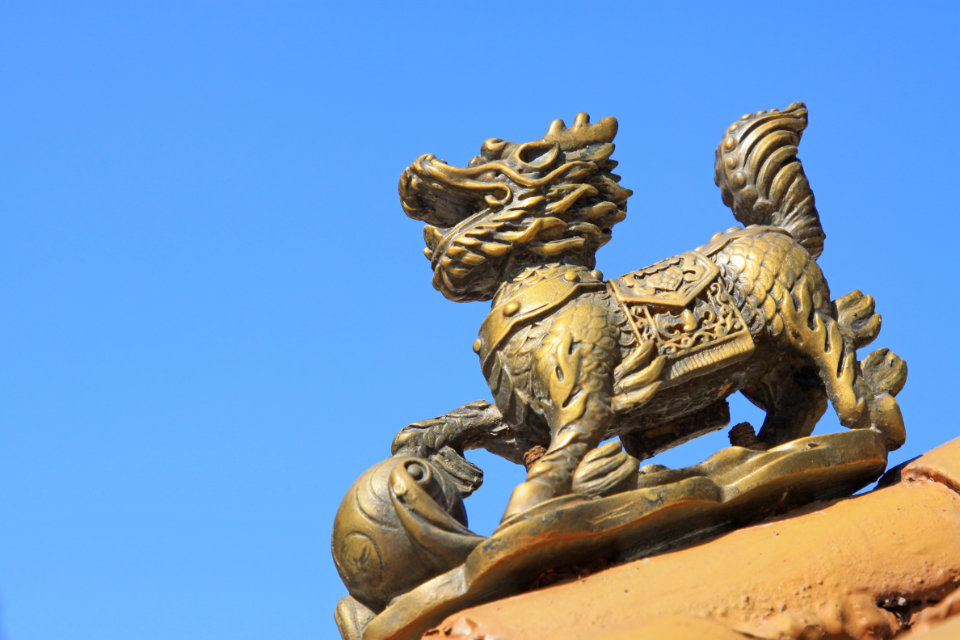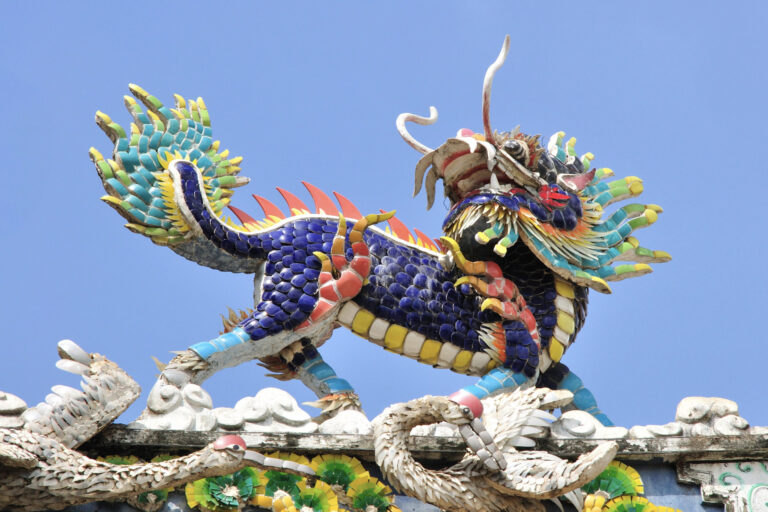The Qilin (麒麟), a captivating emblem from Chinese mythology, embodies the promise of good fortune, prosperity, and tranquility when harnessed through Feng Shui practices.
In the realm of traditional Chinese beliefs, the appearance of this mythical creature is heralded during the reign of virtuous rulers or on occasions marking the birth or departure of sage figures.
This elevates the Qilin to a status of high reverence and auspiciousness within Chinese culture, making Qilin in Feng Shui (麒麟风水) a sought-after conduit for channeling positive energies and bountiful opportunities.
In this Article
Historical Roots of Qilin (麒麟)
The ancient narrative of Qilin traces back to the days of virtuous emperors, where its appearance was seen as a divine endorsement of the ruler’s benevolence.
Historical texts and folklore often chronicle the arrival of Qilin as a harbinger of good fortune and divine favor, cementing its status as a celestial creature of good omen.
Morphological Mystique
The Qilin is often depicted as a hybrid creature, embodying features of a dragon, deer, and other animals, encapsulating a unique morphological mystique.
Its peculiar yet harmonious blend of attributes symbolizes the peaceful co-existence of diverse elements, further underlining its status as a creature of goodwill and harmony.
The Four Major Qilin (麒麟)
The ancient mythical creature, Qilin, has various forms and attributes. Among these, the four major Qilin are distinguished based on the elements they embody: Fire Qilin (火麒麟), Water Qilin (水麒麟), Wind Qilin (风麒麟), and Thunder Qilin (雷麒麟).
The Qilin is one of the Ten Great Mythical Beasts and one of the Four Auspicious Beasts of ancient times, sharing the high regard with dragons and phoenixes. These three mythical creatures symbolized the domains of land, sea, and air during ancient times.
Known as the king of beasts, the Qilin has a peculiar appearance, bearing a lion-like head, deer antlers, tiger eyes, and dragon scales. It is believed that a Qilin has a long lifespan, living up to two thousand years even without any special nurturing.
Let’s delve into the distinct attributes of the Four Major Qilin:
Fire Qilin (火麒麟)
The Fire Qilin is depicted with a red body, skilled in manipulating divine fire. Its fire, known as “world-shocking flames,” could turn anything to ashes.
It served as the mount for the ancient Yan Emperor, proving impervious to weapons, and had the ability to breathe fire and consume metal. Whenever Yan Emperor went to battle, the Fire Qilin accompanied him.
Water Qilin (水麒麟)
With a blue body, the Water Qilin is known for its mastery over water. It is said that a Water Qilin was stationed under the Qingyun sect, where it was revered as “Ling Zun (灵尊)” by the sect members due to its unique abilities.
Wind Qilin (风麒麟)
The Wind Qilin, adorned with a green body, has lesser known tales. However, it is associated with the formidable wind called Sanmei Divine Wind in mythology.
It’s intriguing to ponder whether the Wind Qilin could be the true form of the cloud that Sun Wukong, the Monkey King, rode, as his cloud could traverse 108,000 miles in a single somersault.
Thunder Qilin (雷麒麟)
The Thunder Qilin, with a purple body, is the most enigmatic among the four. Although detailed records are scant, it is believed to have the power to summon thunder and lightning.
The manner in which it unleashes lightning is a subject of curiosity; it’s hypothesized that the Thunder Qilin might use its horn to channel this fearsome ability.
The diverse embodiments of Qilin as per the elements they represent, encapsulate the multifaceted nature of this mythical creature, each form bearing its unique significance and power in Chinese mythology.
Through the tales of Fire, Water, Wind, and Thunder Qilin, we uncover the extensive and varied mythical narrative that the Qilin holds in Chinese culture.

Symbolic Significance
The Qilin’s symbolism transcends its morphological appearance, embodying good luck, prosperity, success, and longevity.
Its presence, often associated with auspicious events, reflects the profound reverence and moral symbolism it holds in Chinese culture.
Across Cultures
Beyond China, the Qilin has permeated other East Asian cultures like Japan (Kirin) and Korea (Girin), each with its unique interpretation and symbolic significance.
While the core essence of good fortune and benevolence remains, the portrayal of Qilin adapts to the cultural nuances of these regions.
Qilin in Feng Shui
The use of Qilin in Feng Shui is aimed at harnessing positive energies and warding off negative influences. Here’s how to utilize the Qilin effectively in Feng Shui:
- Placement: Position a Qilin statue or image facing the entrance of your home or office to ward off negative energies and welcome prosperity.
- Material: Choose a Qilin figurine made of favorable materials like metal or crystal to enhance its energy.
- Pairing: Qilins are often used in pairs to balance yin and yang energies, promoting harmony and good fortune.
- Affirmation: Accompany the placement of Qilin with positive affirmations and intentions to enhance its auspicious energy.
Feng Shui Taboos for Placing Qilin:
- It is not advisable to place a Qilin that has not been consecrated. Qilin is used to ward off negative energies, and it needs to be consecrated before being placed. An unconsecrated Qilin will not have the effect of warding off negative energies, and there’s a possibility that the auspicious nature of Qilin might be overtaken by ominous energies, bringing misfortune to the household.
- It is not advisable to place the Qilin outside a window. The Qilin is a sacred and spiritual entity and should be treated with respect. Placing the Qilin on a window or outside of it shows disrespect to the Qilin.
- People with ill intentions or those involved in nefarious industries should not place a Qilin. It is believed that Qilin loves to help good people, especially those who are filial and kind, earning it the title of “benevolent beast.” When a Qilin encounters a bad person, it will chase and bite them. Therefore, individuals or businesses involved with prostitution, gambling, drugs, whether in residences or companies, should not place a Qilin.
- Qilin is adept at neutralizing various negative energies including the Three Killings (三煞), Five Yellow (五黄煞), Heaven Chopping (天斩煞), Piercing Heart (穿心煞), Sickle (镰刀煞), Corner (屋角煞), Knife (刀煞), White Tiger (白虎煞), and Two Black Illness Star (二黑病星符). When a residence encounters the above negative energies leading to unrest, loss of wealth, family discord, car accidents, bloodshed, divorces, etc., having a Qilin can help maintain peace. Qilin is a benevolent creature that punishes the wicked, eliminates evil, and protects the good. Good people are protected by venerating Qilin, while evil ones face retribution when they try to venerate it.
What are the Feng Shui effects of Qilin:
- Qilin is highly effective in neutralizing various negative energies including the Three Killings, Five Yellow, Heaven Chopping, Piercing Heart, Sickle, Corner, Knife, White Tiger, and Two Black Illness Star. When a residence is affected by these negative energies, causing family discord, loss of wealth, accidents, bloodshed, divorces, etc., having a Qilin can help maintain peace.
- Qilin is the strongest in warding off negative energies when placed in a home. Those who venerate it should often express gratitude for its protective nature. Placing a pair at home, with their heads facing towards the door or window, can help alleviate disasters, ward off evil spirits, stabilize the household, attract wealth, attain higher positions, and also serve the purpose of bringing in offspring. Unlike lions and tigers, Qilin does not harm good people.
- In Feng Shui, Qilin also has the effect of promoting offspring, hence there is a saying in folklore about “Qilin bringing sons.” It can be placed in the wealth position with its head generally facing towards the main entrance to ward off evil spirits, attract wealth, and promote prosperity, literary fortune as well as more offspring and grandchildren. When placed in offices, living rooms, or entrances, it can attract wealth.
- It has the effect of neutralizing the negative energies of the White Tiger. Placing a pair of bronze Qilin in the White Tiger position of a home can neutralize the fierceness of this sector, ensuring the safety of the residents, especially when sharp objects or chimneys from outside are directed towards this sector. It’s even more important to place a consecrated bronze Qilin in such scenarios.
- It helps to improve family fortune and mitigate disasters. Being a symbol of auspiciousness, placing Qilin at home can stabilize the household, ward off evil spirits, and add auspiciousness, not only facilitating the smooth progress of the homeowner’s career but also improving financial fortune. Besides, bronze Qilin can also ward off bad luck on behalf of the owner. Generally, the bronze Qilin used for changing fortune should be consecrated to fully harness its power.
Feng Shui Placement Positions for Qilin
- Placing Qilin at the Main Entrance: Positioning Qilin at the entrance of the house, with its head facing outward, can ward off negative energies and boost the household’s financial fortune. It’s generally advisable to choose a delicately crafted Qilin for this purpose. Placing it at the main door can enhance the fortune of both male and female members of the household.
- Placing Qilin in the Wen Chang and Wealth Positions: Placing Qilin in the study room or the Wen Chang position indoors can be beneficial. Typically, a pair of Qilin are placed on a desk in the study room or on the office desk, with their heads facing the doorway and tails facing oneself. If the pair consists of male and female, they should be placed one on the left and the other on the right. If utilizing Qilin to attract wealth, placing a pair of them in the wealth position would suffice.
- Placing Qilin in the Yi Ma Direction: Placing Qilin in the Yi Ma direction is a strong enhancer for career advancement and gaining favor from superiors, facilitating smooth official fortune.
- Placing Qilin in the Bedroom: Placing Qilin within the bedroom is an auspicious practice for those seeking to have children.
- Placing Qilin in the Living Room: According to ancient home setup practices, Qilin should be placed opposite the door in the living room, showcasing reverence for the spiritual entity. Placing a pair of Qilin in the White Tiger position in the living room can neutralize the negative energies of this sector, ensuring the safety of the residents, especially when sharp objects or chimneys from outside are directed towards this sector. It’s even more crucial to place a consecrated Qilin in such scenarios.
Embracing the Power of Qilin in Feng Shui
The narrative of Qilin unfurls a rich blend of Chinese cultural, moral, and spiritual ethos, seamlessly intertwining with the practice of Feng Shui.
Its enduring significance, traversing from ancient lore to contemporary interpretations, beckons individuals to delve deeper into the heart of Chinese mythological traditions.
As viewed through the diverse prisms of history, art, and Feng Shui, the Qilin emerges as a perennial emblem of auspiciousness and moral integrity, offering a window into the celestial harmony as envisaged in Chinese ethos.
Through the practice of Qilin in Feng Shui, one can aim to attract a tide of prosperity and tranquility.
As you contemplate the majestic allure of Qilin, have you considered how the Qilin in Feng Shui could unfold a realm of serenity and abundance in your surroundings?
What is the significance of Qilin in Feng Shui?
The Qilin, a mystical creature in Chinese mythology, is a symbol of good fortune, prosperity, and serenity in Feng Shui. Its presence is believed to attract positive energies, ward off negative influences, and bring about auspicious opportunities.
How to place Qilin in Feng Shui for optimal benefits?
In Feng Shui, placing a pair of Qilin at the entrance with their heads facing outward can ward off negative energies and boost financial fortune. They can also be placed in the wealth position, Wen Chang position, or Yi Ma direction to enhance career, wealth, or official fortune respectively.
What are the dos and don’ts of placing Qilin in Feng Shui?
It’s important to place Qilin in respectful positions like facing the entrance or in the living room opposite the door. Avoid placing unconsecrated Qilin or positioning them outside windows as this is seen as disrespectful. Also, those involved in negative professions or actions should avoid placing Qilin as it’s believed to chase and bite the wicked.
Can Qilin in Feng Shui help in personal life aspects like relationships or childbearing?
Yes, placing Qilin in the bedroom is an auspicious practice for couples seeking to have children. Additionally, the proper placement of Qilin in Feng Shui can enhance the fortune of family members, fostering harmonious relationships within the household.



